The History of Bitcoin in Casinos: The Complete Story of its Rise among Gamblers
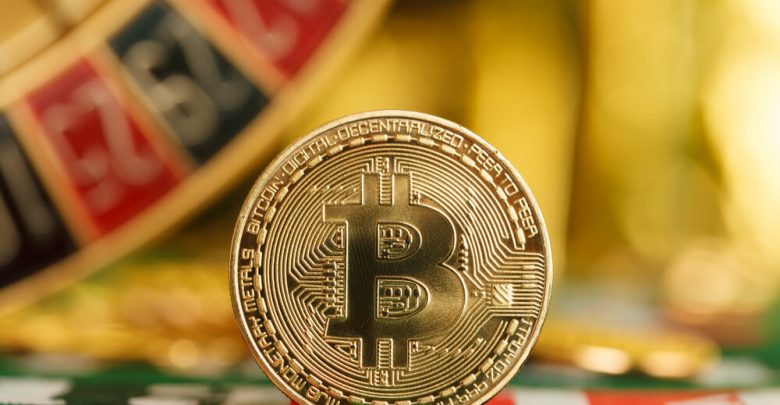
Bitcoin is on the tip of every financial junkie’s tongue. You almost certainly know someone who tells you on a regular basis that if you haven’t yet gotten into “crypto” as an investment vehicle, you’re a sucker.
Less touted is the importance of Bitcoin in casinos. When you learn a little about the underlying technology, Bitcoin and online casinos seem kind of made for each other. In many ways, the acceptance of Bitcoin and the boom in online casinos have walked hand in hand.
Let’s take a deep dive into the history of Bitcoin in casinos.
First Things First: What’s Bitcoin and Who Created It?
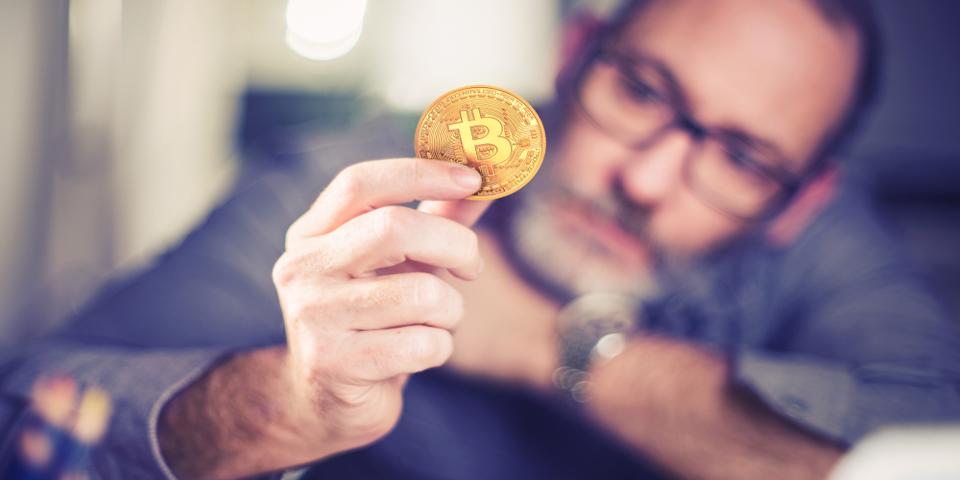
Bitcoin is a “cryptocurrency,” a type of online currency that is not tied to the credit of an issuing authority (historically, countries or states). The story of the creation of Bitcoin is intimately tied with the creation of a technology called blockchain, which in itself may be a bigger revolution than the insanely popular cryptocurrency it spawned.
Both Bitcoin and blockchain were invented by “someone” called Satoshi Nakamoto. “Someone” goes in quotes because no one has any idea who Satoshi Nakamoto really is, or even if Nakamoto is one person or a pseudonym for several people.
Japanese-American physicist Dorian Nakamoto was “outed” for being Satoshi on the basis of slim evidence. In the midst of the ensuing media circus, he vehemently denied any involvement with Bitcoin. Other suspects for Satoshi include Australian scientist Craig Wright, and American computer scientist Nick Szabo–but no one knows for sure. The name suggests Japanese descent, but the documents that introduced Bitcoin read like a native English speaker’s.
Key among the documents in question is the Bitcoin White Paper, which described Bitcoin—something then completely new to the marketplace, and entirely digital and fully functional currency—as well as the blockchain technology that made it possible.
What is a Currency?
What is money? It’s not a lightweight question, because many philosophers argue that money isn’t “real.”
Most money, after all, is printed on paper. How could a single piece of paper be worth $20 when a paperback book costs $7?
Money is valuable because we agree that it has value. We assign it a notional value, all participating in the same game of Monopoly, and we agree that the paper money has X value within the context of our communal game. The more you think about it, the stranger it gets!
Another word for what we think of as “money” is fiat currency. “Fiat” is a latin word for an order, like a police officer or military general might issue, a command with the force and authority of law behind it. Paper money is valuable because the government says it is valuable. As such, we could trade in anything. Pigs, cotton buds, or tableware could equally be imbued with the notion of “value”–since it is essentially just that, a notion. If suddenly, we all were told to forget notes and trade in cotton buds, “money” as we knew it hitherto would be rendered a zero-value item and the cotton buds would be currency king.
In fact, the government is very prickly about its right to assign value to its currency.
King William II of England famously castrated and cut off the hands of conspirators who undermined the King’s coinage, and the majority of his subjects—who, only years earlier, had been conquered by William’s Norman father—didn’t raise an outcry because they didn’t want their money undermined either.
To this day, in the US, if a business refuses to accept US dollars and cents as a legitimate currency, it is a felony falling into the same category as treason, because it flouts the “full faith and credit” of the government to mint valuable currency.
This is in spite of the fact that governments have been historically unreliable in maintaining their currency, printing extra money whenever they needed it to pay down debts and causing rapid inflation.
It didn’t used to be like this. Some things have been currency since the beginning of recorded history, because they were both valuable and scarce.
Now, scarcity is certainly a thing–it strongly affects the ability of something to be considered an effective currency.
Gold is the perfect example. It has always been valuable as a medium of trade because it is beautiful, hard to find, and in limited supply.
Paper currencies like the US dollar used to be backed by a “gold standard”—in other words, for every paper dollar in circulation, the US government held a dollar’s worth of gold in its treasuries, much of it stored in Fort Knox, Kentucky. Many commentators believe that this is when a dollar was actually worth something tangible, and the “full faith and credit” of the government issuing it meant something.
However, President Nixon took the US off the gold standard in 1971, opening the door to galloping inflation.
What Is Blockchain?

Fast-forward to 2008.
Buried in the Bitcoin White Paper was a description of the digital technology that made Bitcoin possible—blockchain.
Blockchain is based on the idea that discreet bits of information—”blocks”—can be stored on a series of different computers—the “chain.” This creates a digital ledger which is self-correcting and public facing, making it very hard to falsify. If one block is tampered with, thousands of other computers in the chain are on hand to correct it.
Once the blockchain is established, it takes on a life of its own. No one manages it, and no one can alter it without getting caught. Even if it were to be actively destroyed, the record of every action on the chain would be preserved, up to and including its destruction, because it exists in a decentralized haze across thousands of servers.
Because it can’t be hacked or falsified, blockchain stands to revolutionize record-keeping, including the recording of iron-clad contracts.
What Is a Cryptocurrency?
A cryptocurrency is an offshoot of blockchain’s integrity. Remember, currencies depend on an agreement of value and scarcity, historically backed by the “full faith and credit” of a government.
Blockchain, by its unhackable nature, demanded both faith and credit. All that was left was to create scarcity and a perception of value.
The Bitcoin White Paper described a unique unit of data called a “Bitcoin.” A Bitcoin could only be created if a series of digital “puzzles” were solved, complex math equations that participating entrepreneurs could dedicate powerful computers to solving. Once the problems were solved, the “Bitcoin” code emerged, and a new Bitcoin came into existence. Since the process spiritually resembled “digging” for gold, this computerized unearthing of Bitcoins was dubbed “mining.”
Furthermore, the Bitcoin white paper made it clear that only 21 million Bitcoins could ever be mined, making it an inherently scarce resource.
All the pieces were in place. Bitcoin was trustworthy and scarce; all that had to happen was for people to agree that it was valuable.
They did, almost immediately beginning to trade fiat currency for Bitcoin. Now, a new currency, completely independent of governments, had emerged from blockchain. Due to the decentralized, public-facing nature of the Bitcoin ledger, Bitcoin transactions are:
- Private.
- Irrevocable.
- Nearly impossible to falsify.
- Untraceable.
- Not subject to inflation.
- Nearly impossible to assess for taxation.
The Silk Road
Bitcoin first exploded into the public consciousness thanks to the Silk Road, a dark-web marketplace that used TOR–an untraceable web browsing technology–to facilitate sales of drugs, mostly marijuana, with Bitcoin as the currency. Some hard drugs were certainly sold, but reports that guns, human cargo, or murder-for-hire services also traded on the Silk Road were never substantiated.
Still, the media went crazy over the “dark-web drugs marketplace.” When the founder of Silk Road, a young Texan named Ross Ulbricht, was uncovered, he was indicted and, ultimately given the draconian sentence of life in prison without parole, unheard of for most first-offender narcotics felonies.
Governments hate the undermining of their currencies, even more than they hate drug dealers.
The Bitcoin Boom

With its whiff of infamy from the Silk Road scandal, Bitcoin enjoyed a surge of popularity. Suddenly, the value of Bitcoin began to skyrocket. Valued at $0.003 in March of 2010, one Bitcoin vaulted to a high of almost $20,000 in December of 2017 before cratering to $3,300 in December of 2018. Bitcoin owners could now become millionaires overnight. Others lost their money just as fast when it declined a little after the peak. While sometimes touted as an “investment vehicle,” Bitcoin (or “BTC” as it is known in investment markets) remains extremely volatile.
How Long Have Casinos Been Using Bitcoin?
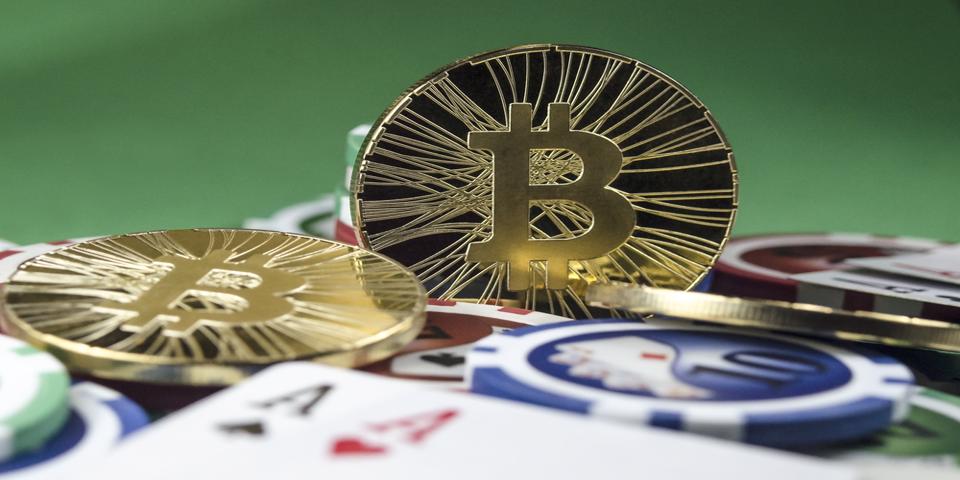
It’s hard to build any definitive history of Bitcoin usage, because privacy is baked deep into the Bitcoin cake. Yes, the blockchain ledger is public-facing, but it just shows that transactions happened, not the nature of the transaction, i.e. what was bought or sold.
That being said, it’s pretty safe to call April 2012 the birth month of Bitcoin in casinos. That was the month Eric Voorhees launched Satoshi Dice, a random-number-generator (RNG) digital game of chance that allowed members to bet their Bitcoin on virtual rolls of RNG “dice” with a house edge of about 1.8%.
There’s no more reason to believe “Satoshi Nakamoto” was actually involved in the creation of Satoshi Dice, than we can be sure he (or she…) was in the creation of Bitcoin. More likely, Voorhees and his team sought to trade on the mystery of the Nakamoto identity to increase the brand recognition and authority among Bitcoin enthusiasts.
Satoshi Dice had a tumultuous early run. US users were barred from the site in 2013 for legal reasons. Today, shares of Satoshi Dice are traded on a Romanian market.
The popularity of Satoshi Dice is hard to quantify, again due to the secretive nature of the Bitcoin ledger. One thing is known for sure, though—after Satoshi Dice launched, daily Bitcoin transactions quintupled. It’s pretty safe to assume that there was a market among Bitcoin owners for gambling and games of chance.
In January of 2014, Malta-based online casino Vera&John, a major player in the online gambling space, became the first licensed casino to accept Bitcoin deposits.
Other online casinos, sportsbooks, and poker rooms followed suit in accepting Bitcoin, including:
- Slots.lv
- Red Dog Casino
- Bit Starz
- Cloudbet Sports
- Sportsbet.io
- Betcoin Casino
- Betcoin Poker.
Today, one in seven online casinos or sportsbooks accepts Bitcoin.
January 2014 also saw the first two Las Vegas land-based casinos begin to accept Bitcoin; the Golden Gate Hotel & Casino and The D Casino Hotel began accepting it at their front desks. Later, it was also possible to pay by Bitcoin at the gift shop at The D, and in the restaurants American Coney Island and Joe Vicari’s Andiamo Italian Steakhouse, again both located at The D.
Notably, however, neither of these land-based casinos accepts Bitcoin at the cage to gamble with, possibly due to the difficulty of taxing Bitcoin transactions.
At present, only one land-based casino in the world accepts Bitcoin at the cage—the Merit Hotel Nicosia in Cyprus.
What are the Advantages of Gambling with Bitcoin?
Bitcoin has many obvious advantages as a currency for online gamblers. Here are a few of the reasons gamblers gravitate to Bitcoin to replenish their bankrolls …
Decentralized

With no regulatory agency or bank in control of the flow of Bitcoin, there is no way yet devised that anyone can seize your money. Once you own Bitcoin, it is yours, the transaction recorded on a ledger diffused out to thousands of computer servers to prevent tampering. So, it’s safe to say Bitcoin is almost impossible to steal or hack.
Privacy
The blockchain ledger that records Bitcoin transactions records the date, amount, and transaction ID details of a Bitcoin transaction, but it doesn’t tell you who made the transaction and for what.
The parties themselves can point to the ledger to resolve disputes, but any unauthorized party looking in on the transaction ledger will never be able to tell that the transaction was a deposit to or withdrawal from an online gambling account. Unauthorized parties could include employers, spouses, law enforcement bodies … really, anyone.
What about the authorized parties—the people in charge of Bitcoin?
Well, that’s a non-starter too. See above—there is no one in charge of Bitcoin. It’s a self-perpetuating machine set in motion. Even Satoshi Nakamura couldn’t spy on or tamper with Bitcoin transactions. That’s the innovation of blockchain.
Security

While many might argue that the anonymity of Bitcoin facilitates crime, it can also work in reverse. Bitcoin transactions are some of the most secure currency transactions on the market. The user does not need to submit any identifying information, making the transactions impossible targets for identity theft.
Bitcoin transactions are binding, and not subject to chargebacks–meaning that once the transaction is initiated, it’s a done deal. The decentralized ledger makes it nearly impossible to falsify the record. Try and tamper with one part of the chain–and thousands of other records are affected.
Not Subject to Taxation
Gambling winnings are taxable in most jurisdictions. Many users love to use Bitcoin in casinos because Bitcoin is not taxable—or at least, no government has come close to developing a method of tracking and taxing it effectively.
Not being a fiat Bitcoin, it is immune to the scrutiny and control of any taxing authority. If converted to a fiat currency, it may be subject to taxation … but as long as it stays in cryptocurrency form, it remains protected from taxation.
Convenient
As complicated as blockchain technology itself may be, Bitcoin transactions are extremely simple to execute and mobile-friendly, whether sending Bitcoin across the street or across oceans—important for online gamblers, since many of the sites operate offshore.
Fast
When online gamblers feel a lucky streak coming on, they want to get to gaming now. Bitcoin transactions have the advantage of being instantaneous … at least, for deposits. They process as soon as initiated and should be available right away for gambling. Bitcoin withdrawals from an online casino tend to take 2-3 days to process, but that’s actually on the faster end of processing times, compared to alternative withdrawal methods.
No Fees or Low Fees
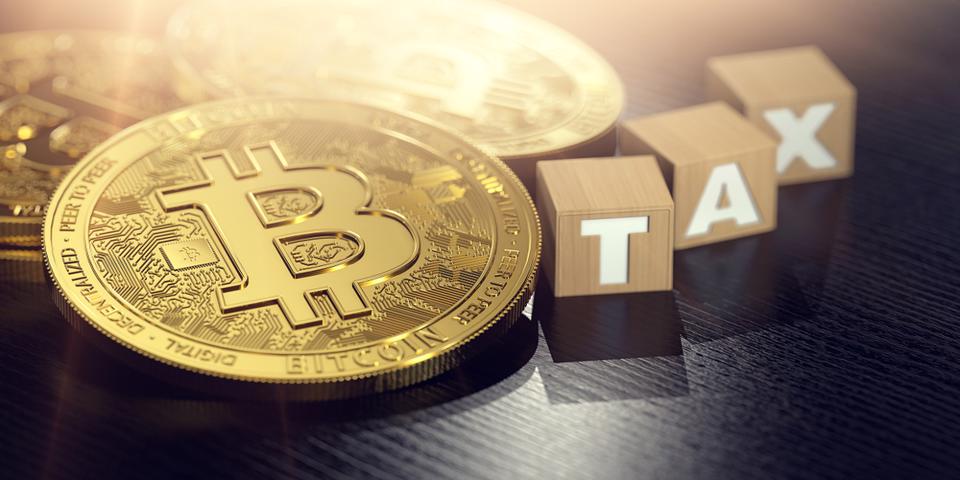
Some methods of casino deposit incur fees for either the player or the online casino. Bitcoin transactions, by contrast, carry small fees compared to other methods of online gambling transactions. In many cases, the transactions carry no fees at all.
Inflation-Proof
While Bitcoin is known to fluctuate in value, it is not subject to inflation the way fiat currencies are. Fiat currencies inflate because the governments that back them are authorized to print more and more of that currency, which has an impact on the ability of debts to be paid off but makes the currency less valuable overall.
The Bitcoin ecosystem is designed such that there will only ever be 21 million Bitcoins, ever. While its value continues to rollercoaster, it will never inflate.
Never Declined
Many banks and credit card issuers decline transactions coded for online gambling, even in jurisdictions like New Jersey where online gambling is licensed and legal. This is partially risk management on the part of the banks which rely on governmental approval to do business, and online gambling is often considered dicey from a legal perspective.
For a long time, no Visa card could be used for an online gambling transaction. Those restrictions have relaxed a bit, but banks still likely to decline gambling transactions include Bank of America, BB&T, Capital One 360, JP Morgan Chase, PNC, Regions Bank, SunTrust Bank, and Wells Fargo. That’s kind of a lot.
Bitcoin labors under no such restrictions, being immune to government oversight and free from moralizing about the relative ethics of gambling. Bitcoin transactions for online gambling never get declined. There’s simply no regulatory authority within Bitcoin to tilt the currency against gambling.
Preferred by Casinos
For many of the same reasons players love it—fast, no chargebacks, minimal fees, resistant to inflation, private, and secure—casinos love Bitcoin as well. Some online casinos that accept the cryptocurrency deliberately court BTC owners by offering special bonuses and promotions triggered by deposits of Bitcoin in casinos.
It’s Not “Real” Money

As mentioned, there’s an argument to be made that Bitcoin is more “real” than a fiat currency—it’s a secure asset of established scarcity with inherent value. However, without widespread acceptance—i.e. the ability to use your Bitcoin wallet at a grocery store, it remains something of a fringe currency. Unless you exchange your Bitcoin for the local fiat currency (sacrificing the advantages of Bitcoin), there are few things you can do with it.
Online gamblers using Bitcoin aren’t risking their grocery money, and this makes it a fairly responsible funding method for gambling; a key tenet of responsible gambling is to never gamble with money you can’t afford to lose. With few Bitcoin owners relying on their BTC stash to make the mortgage, there’s an argument to be made that this fringe currency is easier to lose than day-to-day–useful–fiat currency.
Are There Drawbacks to Gambling With Bitcoin?
The advantages of Bitcoin in casinos may be offset by certain disadvantages. Players must decide for themselves how this balance pays off.
Volatile Value
As mentioned before, Bitcoin has made headlines most recently not for the benefits of blockchain technology, but rather for its volatility.
Any volatile asset makes an interesting investment vehicle. Buyers who got in at the right time quickly became rich on paper as the value of BTC soared. Buyers who got in at the wrong time or stayed in long enough for BTC to plummet lost fortunes … again, on paper.
In some ways, this volatility is perfect for gambling, since players tend to be up or down as a function of luck and chance. This may be slim comfort, however, if the player triples his/her money on a lucky online slot spin, only to see Bitcoin tank to a quarter of its previous value the next day.
No Take-Backs
Once a Bitcoin transaction is processed, it is done. It can’t be canceled or interrupted with a stop-payment order. Bitcoin is also untraceable by design, which is what makes it so private and so hard to falsify.
If you think something hinky went down, experience buyer’s remorse, or lose confidence in the online casino, the lack of centralized oversight will suddenly become a liability rather than a benefit. No police, no customer satisfaction chief, and no other governing body will step in to get you your BTC back.
No Guarantee of Fairness
Like Satoshi Dice, a number of online gambling sites that accept Bitcoin are not licensed, meaning no one is looking into whether they offer fair games with an accurate return to player, or even if they will pay out on winnings as expected.
Others are licensed in permissive jurisdictions such as Malta, Cyprus, Gibraltar, and the Isle of Man, which have favorable tax laws, easy licensing requirements, and minimal oversight. These casinos may be able to get away with a lot of bad behavior before the regulatory board takes action—and your BTC could slip right through your grasp in the interim.
Experimental
The features of the Bitcoin wallet are still in their infancy. For all the known unknowns, it’s the unknown unknowns that make it a risky currency with which to gamble.
Uncertain Legal Future
Governments don’t like competition from within for the rights to mint currency. Bitcoin is vulnerable to future legislative challenges. In some countries, cryptocurrencies like Bitcoin are restricted from purchases, restricted from banking, or outlawed completely.
What’s Next for Bitcoin in Casinos?
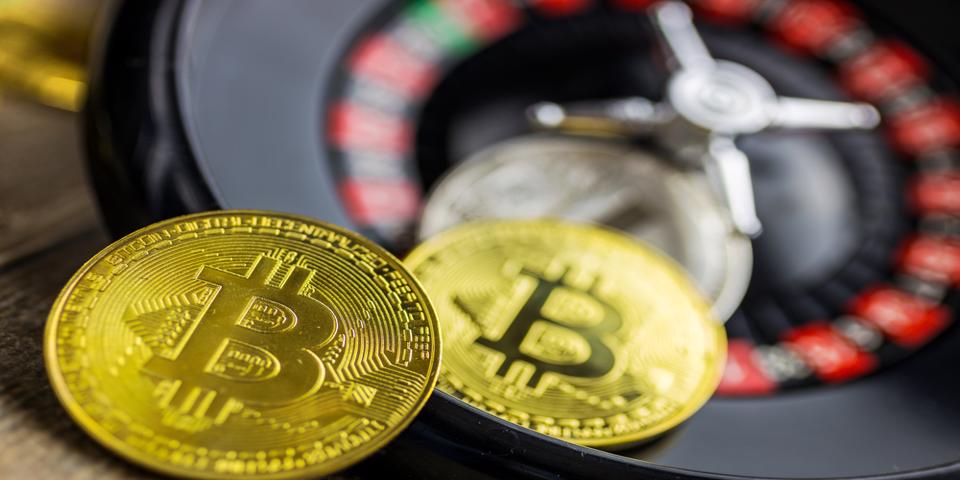
The future of Bitcoin in casinos is heavily tied to the legal status of Bitcoin, which is still in the process of being written.
A number of countries have banned Bitcoin, or restricted its use in purchases or banking. Bitcoin is vulnerable to this kind of legislation. Any other country could be next. Legislation is pending in many, including major players like the US and China.
Beyond its legal status, look for more and more online casinos to accept Bitcoin. The digital currency and online casinos are practically a match made in heaven due to the low fees, limited scrutiny, fast transactional processing, security, and privacy—things the internet was practically made for.
Look for land-based casinos to be slower adopters. With only one land-based casino accepting online bets, it’s clear that these establishments are nervous. Jurisdictions have long been tied to the soil they control, and land-based casinos are married to that soil. They don’t want to be seen as in the business of undermining the currency of a country that could send cops or soldiers knocking.
On the other hand, if the popularity of Bitcoin overwhelms states’ abilities to crack down on it, or if a worldwide recession undermines faith in fiat currencies, look for Bitcoin to enjoy more widespread acceptance overall, in casinos and everywhere else.
Conclusion
A few short years ago, a decentralized currency independent of governments was practically unthinkable. The rise of Bitcoin has proven just how disruptive technological breakthroughs can be.
While it remains on the fringes, it makes sense that Bitcoin is enjoying rapid adoption by a fringe industry like gambling. With online gambling growing at a rapid pace, Bitcoin owners may make good on their early willingness to bet their Bitcoin in casinos.
Being one of the first adopters of anything takes guts and a tolerance for risk. Maybe the fact that early Bitcoin adopters love to gamble with it is the least surprising thing about Bitcoin.






